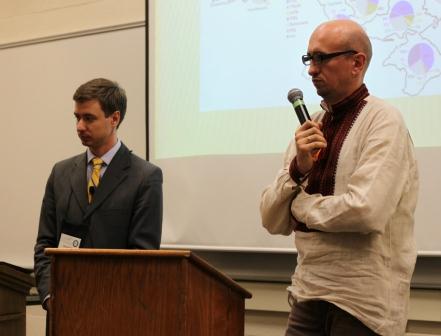





Maksym Vasin (left) and Taras Antoshevskyy answer questions from the audience
Francesco Di Lillo, Research Advisor
Taras Antoshevskyy, Director of the Religious Information Service of Ukraine, and Maksym Vasin, Executive Director of the Institute for Religious Freedom, discussed the status of religious freedom in Ukraine.
Mr. Antoshevskyy, regarded as the leading Catholic expert on religious freedom in Ukraine, offered an historical overview of the presence of Christian denominations in Ukraine, their relationships with each other and the state, leading up to our days and. He explained that Ukraine enjoyed centuries of peaceful coexistence between different religious groups, even at times when the rest of Europe was thorn by religious persecutions.
Things changed under the dictatorship of Stalin and the Soviet regime, he added, as the Communist Party contributed to the internal displacement of many citizens. Many religions were outlawed and others, like the Greek-Roman Catholic Church, were forced to operate clandestinely. Protestants and Jewish suffered persecutions as well.
Today, Ukraine is home to the Ukrainian and Russian Orthodox Churches, the Greek-Roman Catholic Church, as well as to many protestant movements (collectively the largest group after the Orthodox Churches) and a large population of Muslims and Jews. Many issues concerning religious liberty, however, continue to exist due to the many decades of Soviet rule.
Although religious denominations are generally free to operate, government and political leaders have a hard time to accept the positive contributions of religion to society. As a result, they try to diminish the level of influence of Churches in the public sphere, while using their influence for their own political purposes. Considering the growing influence of secular and atheist interest groups and the concurrent attitude of some media that exacerbates the public debate, Churches in general find it very difficult to counterbalance their voices.
Nonetheless, today, he concluded, many Churches and denominations feel comfortable in Ukraine and that is positive to society as a whole. It is the general opinion of religious liberty observers, however, that much more needs to be done to guarantee basic religious rights, foster mutual understanding among Churches and promote the positive role of religion in Ukrainian society.
Following Mr. Antoshevskyy's remarks, Maksym Vasin discussed the role of religion in the formation of a democratic society in Ukraine.
Since 1991, when Ukraine was proclaimed an independent state, many Churches and religious communities left clandestine activity and a large confessional network was created. Today, according to official data as of beginning of 2012, more than 36.500 religious organizations and 55 religious movements can be found in Ukraine.
This fast-paced growth raised the question of how to maintain religious peace and tolerance among so many confessions in such a multicultural country. Under the direction of the State Committee on Religious Affairs, the Ukrainian Council of Churches began its operations in 1996, to become an independent body later in 2005. Throughout the years, other interdenominational advisory committees were formed to foster dialogue and partnership between Churches and the State, especially in the fields of public health, education, and policies related to religion in the public sphere.
Today, although the President of Ukraine, Viktor Yanukovych, recognizes the valuable contribution of religious organizations as partners of the State, there are almost no opportunities to promote a constructive dialogue between Churches and the Government. Under these circumstances, Ukraine has seen “the emergence of legislative initiatives that narrowed the scope of religious freedom,” Mr Vasin explained.
Mr Vasin then concluded his presentation emphasizing that “in the multi-confessional society there is no alternative to interdenominational and Church-State dialogue. [It] allows to form in society an atmosphere of religious harmony, prevent religious hatred and keep the peace, creating practical mechanisms to ensure the fundamental right to freedom of religion.”
